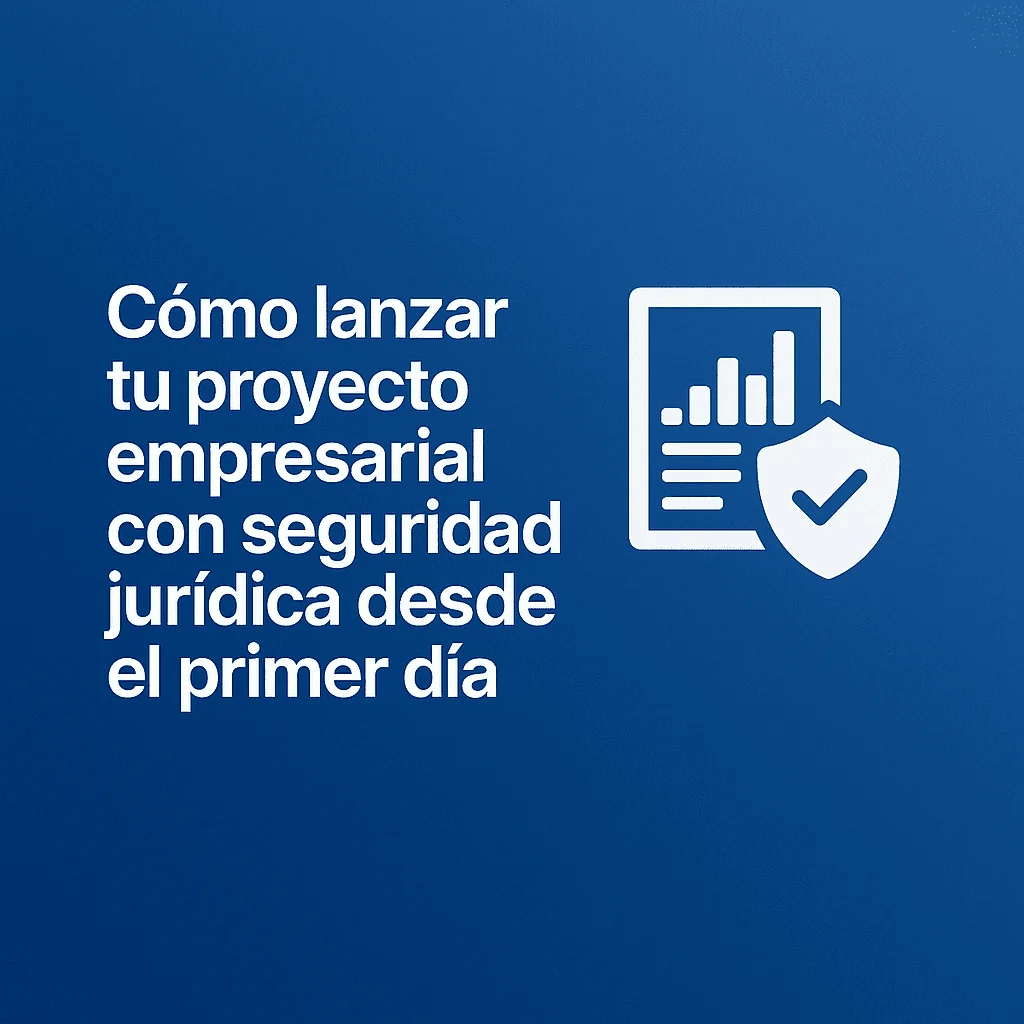How to Launch Your Business Project with Legal Security from Day One
Launching a business project is an exercise in vision and energy.
But if it isn’t built on a clear legal foundation, the initial enthusiasm can quickly turn into a source of future problems.
In this article, we address the decision-making process of entrepreneurship from a legal perspective, identifying the most common mistakes and offering a roadmap that combines strategy with regulatory compliance.
1. Introduction: Legal Security from the Very First Step
At the early stages of a project, it’s understandable to focus only on the idea, product, or market.
However, adopting a legal perspective from the design stage allows you to anticipate risks, set operational frameworks, and avoid future costs.
In this context, legal advice should not be seen as an expense but as an investment that provides security, agility, and long-term sustainability.
2. Conduct an Analysis and Inventory of Your Current and Immediate Situation
Before incorporating a company or signing contracts, it’s essential to conduct a realistic assessment of the founder’s situation:
- Do you have the financial means?
- Are you starting alone or with partners?
- Do you have experience in the sector?
- Will your activity be regulated or subject to administrative authorization?
This preliminary exercise will help define the most suitable legal structure and prevent rushed decisions that later complicate operations.
3. The Launch Analysis: The Legal Side You Should Never Ignore
3.1. The First Thought: Taxes
Choosing your business structure (self-employed, limited company, cooperative, etc.) has a direct fiscal impact.
So does the way partners are remunerated, the tax residence, intra-group transactions, and VAT implications depending on the activity.
👉 Proper tax planning helps avoid surprises.
3.2. The Second Thought: Licenses
Not every activity can be carried out freely.
Commerce, hospitality, transportation, healthcare, or technology activities may require licenses, registrations, or sectoral authorizations.
Non-compliance can lead to sanctions or even shutdown of the activity.
3.3. The Reality: Everything You Must Consider
- Data protection compliance (LOPDGDD and GDPR).
- Anti–money laundering requirements, if applicable.
- Intellectual property: trademarks, software rights.
- Key contracts with suppliers, clients, partners, or investors.
- Labor law requirements if hiring employees from the start.
4. Planning and Structure: Design for Scalability and Control
The common mistake is to think only about today.
But a poorly designed legal structure makes it difficult to:
- Bring in investors.
- Issue shares or participations.
- Sell part of the business.
- Plan for succession or exit.
From the beginning, the structure should be simple yet scalable — meaning you can grow on it without dismantling what’s already in place.
A sound corporate and contractual design accommodates expansions, financing, losses, or restructuring.
5. Don’t Rush into Overly Complex Shareholder Agreements
Many entrepreneurs want to protect everything from day one.
But a poorly designed, overly strict, or inflexible shareholders’ agreement can actually block growth.
💡 Recommendation: if there’s no immediate external investment, regulate only the essentials and plan to review it after a few months of real activity.
6. Key Steps to Legally Structure Your Project
6.1. Keep It Simple
Avoid unnecessary complexity.
A Limited Company (S.L.) is sufficient in most cases.
Consider a single-member company if you’re starting alone.
6.2. Limit Risks
Ensure limited liability, comply with tax and commercial obligations, and separate your personal assets from the company’s.
6.3. Tailored Contracts
Negotiate safely.
Have written contracts with suppliers, clients, partners, and collaborators.
Anticipate conflicts and document everything.
6.4. Don’t Rely Solely on Services
If you can build your own product or technology, you’ll have a more sustainable competitive advantage than a purely intermediary business model.
7. Conclusions: Build a Legally Solid and Scalable System
Your project should be built with a structure that is:
- Simple, so you can operate from day one.
- Scalable, so you don’t have to rebuild everything in a few months.
- Legally secure, so you’re not walking on unstable ground.
- Low-risk, so your personal assets are protected.
And above all, supported by the right legal advice.
Because starting a business without legal guidance is not only risky — it’s unnecessary.
Need Help Designing the Legal Framework for Your Project?
At Legal Core Labs, we can help you:
- Structure your business with legal security.
- Draft well-defined contracts.
- Ensure compliance from day one.
Start your business with strategy and legal security.
Build your project on solid ground.



